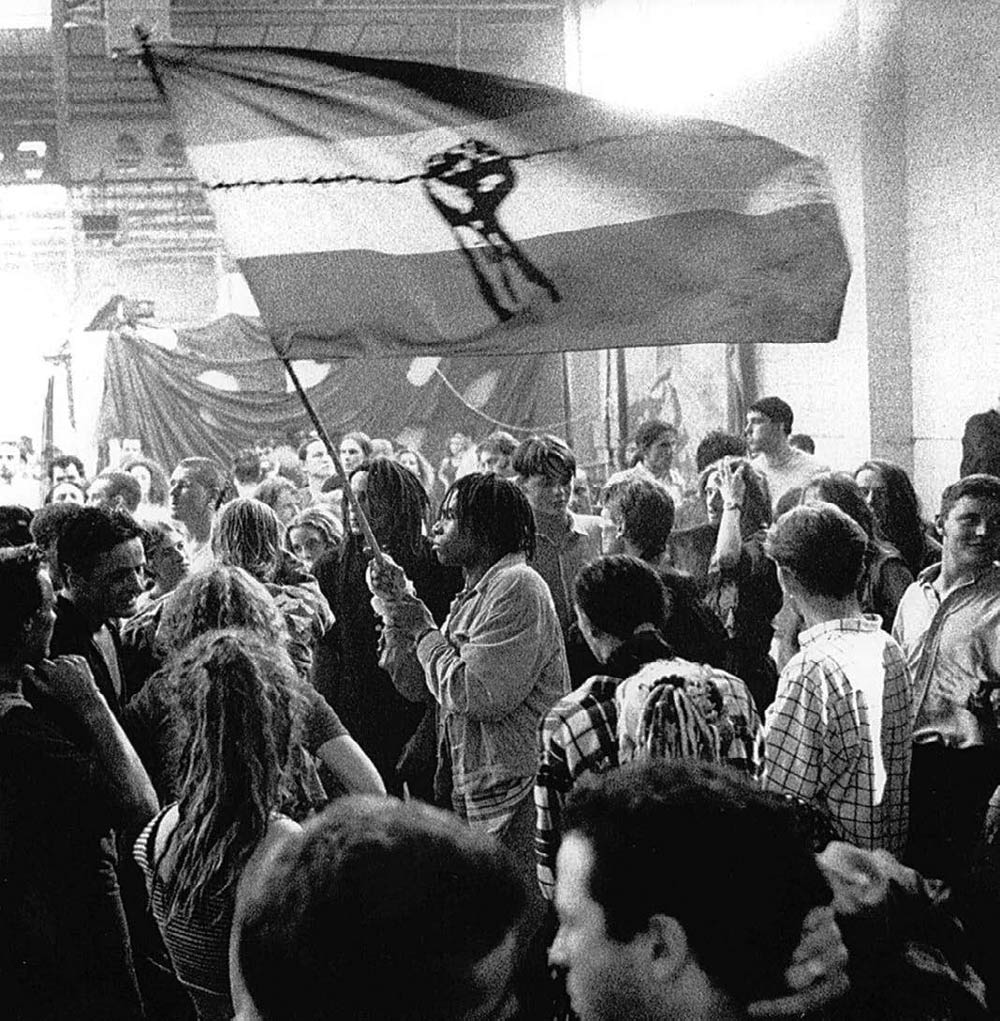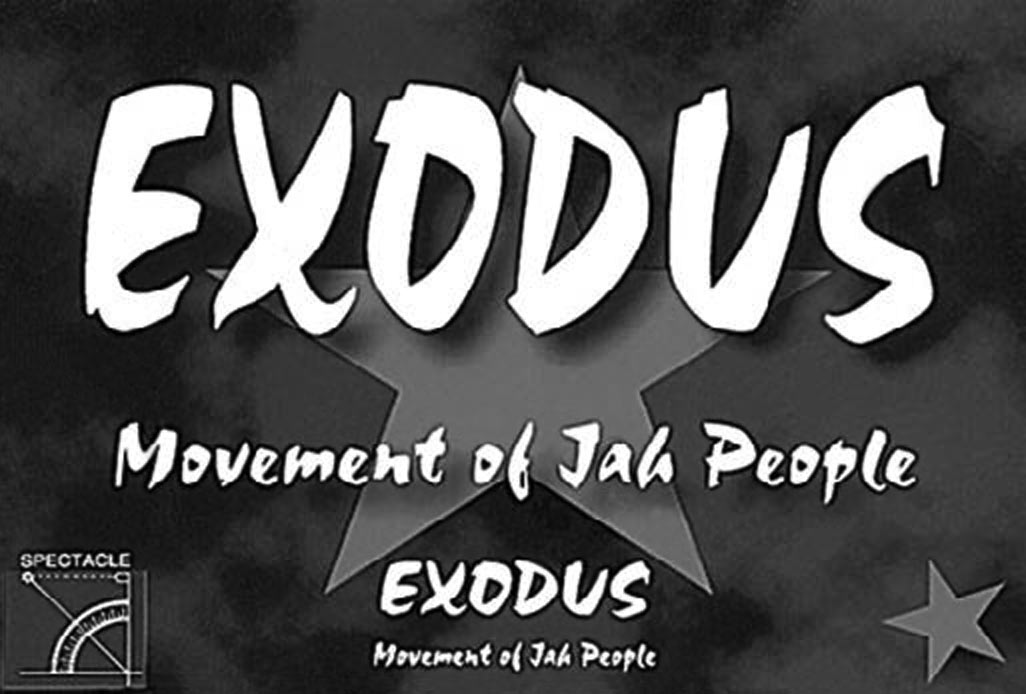
Building Bridges
A recent report written by a lay minister of the CoE praises the spirituality of the Exodus Collective. Jim Carey talked to the author.
Squall 15, Summer 1997, pg. 42.
"Today here in our diocese, we have Exodus... with an alternative to the materialistic and oppressive market-driven society in which we live."
So says a new report on the Exodus Collective written by Malcolm Nobbs, a lay minister in the Church of England.
“The shopping mall has become the church where people go to worship the god mammon. For Exodus neither shopping nor the ownership of commodities is the most important thing in life.”
This 13-page investigation is, without doubt, a bravely candid affair. After all a radical rave collective like Exodus introduces a multitude of controversial social issues; hardly the usual fodder for the parish missilette.
Squall readers will be familiar with some of the attacks levelled against the Collective by other forces of the establishment, but Malcolm Nobbs provides a new insight into the views of the local religious institution.
“They have been attacked by those who see them as a threat, by those who simply do not understand the Collective. I had some trepidation about what the reaction in the church might be, because some of the clergy had been vociferous against them,” Nobbs told Squall. “I had heard that there were things like satanic rights there and that it was demonic; very much the sort of thing which goes with the unknown. It goes right back to the witches in medieval times; people didn’t understand these old ladies so they feared them. It’s people who have no understanding of the situation.”
Nobbs, however, came at the subject from a different angle. “I’m looking for Jesus not only in the church but in people outside the church.”
After watching an episode of BBC1’s Heart of the Matter, which featured Exodus in a debate on dance culture, Nobbs contacted the Collective through Luton Borough Council and was consequently commissioned to write a report for the St Alban’s Diocesan Board for Social Responsibility.
As the report notes: “Jesus himself was seen as threat in his time, though his motives were just... his words and actions increasingly annoyed and threatened the established authorities of the time. They feared a public uprising, they feared loss of power they feared the hypocrisy of their actions would be exposed.”
Describing the Collective as a “movement”, Nobbs’ report draws parallels with the long march of the Israelites away from oppression and slavery in Egypt.
“In the case of the Exodus Collective, they are distancing themselves from what they feel is an unjust and oppressive society. The members have decided that they no longer wish to be thought of as being derelict like the old hospice.”
The hospice referred to by Nobbs is a previously derelict premises in Streatley on the outskirts of Luton, now refurbished by Exodus and renamed Housing Action Zone Manor. As the report notes, it was once - appropriately enough - a refuge for “the waifs and strays of Luton”. Indeed instant feedback to the report came from the Reverend Roger Woods, vicar at Streatley for the last 24 years and once the chaplain of the very hospice now occupied by Exodus. He telephoned Nobbs and asked if he could reprint the report in his parish magazine.
For a publication as candid and open-hearted as this, such reverberations build significant bridges between two sub-cultures; especially when drugs are mentioned.
And much to its credit, the report doesn’t shirk the drugs issue in order to make the story more palatable to a straight audience: “Some people come to the dances and take drugs, mainly cannabis and ‘Ecstasy’....We may or may not approve of the use of drugs but it must be recognised that it is part of today’s culture, not only the youth Dance culture but also drugs are being taken in respectable middle-class homes.”
Malcolm Nobbs does, however, have his own feelings about ecstasy:
“I’ve got to say I oppose it. I personally have worries about how it affects people’s physiology and the mental state. Exodus are proving that you don’t truly need to take the drug. OK there are members who take the drug but there are some members who actually don’t take the drug now and are enjoying that same bonhomie - that feeling with another - the same breaking down of barriers. I think in some way they are a living example that you don’t have to take E to get that, although they might have found that feeling through taking E.”
With cannabis, however, he is less reserved: “If you talked about cannabis then I don’t bother about that at all. It’s no more harmful, if not less harmful than alcohol.”
Again much to his credit, Nobbs ventured to one of Exodus’ raves and found community amidst the techno-jungle. The dancers he interviewed described it “as a warm and good dance…. there is no hostility, dealing in drugs and extortion which can be found at other dances and clubs.”
Malcolm Nobbs is a firm believer in his church but as he readily points out Jesus was politically involved: “In his own way, he did make political statements about the injustices of the world. He was there to buck the trend which is very similar to now because there was a society that had begun to lose its spirituality; the spirituality of the times had become institutionalised and he had come to shake them up”
Indeed, the New Testament story of Jesus up-turning the tables in temple could be taken as piece of direct action against the corruptive power of the market: “We always think of Jesus as meek and mild but he got angry, he got upset. There’s no harm in taking direct action as long as its just.”
There is also no doubt that for Malcolm Nobbs the investigation into the Exodus Collective and their activities was an inspiring experience: “I actually felt closer to God at Exodus than I have in some churches in the diocese.” It will be interesting to see how the institutionalised church swallows such an observation.
Copies of the Malcolm Nobbs’ report on the Exodus Collective are available from The St Alban’s Diocesan Board for Social Responsibility, 41, Holywell Hill, St Alban’s, AL1 1HE. Price £1.

EXODUS – Movement Of Jah People
The 42 minute extended mix of the film first broadcast on Channel Four in 1995.
“This remarkable film is an antidote to the dereliction and paranoia on Britain’s streets. Squatting and renovating decayed buildings, Exodus pursue a mutually agreed quest to regenerate their disaffected community. Their regular free raves bring ex-army, ex-estate agents, ex-shop assistants and ex-criminals together as Exodus, a dance with new direction. For anyone interested in a street relevant discussion on drugs, criminality, spirituality and community, this film is a must see." Squall
Now available on video for £8 individuals and £20 institutions.
Send cheques payable to Spectacle Productions Ltd, to:
Spectacle Productions,
TV Centre, Thackerey Road, London SW8 3TW.
Related Articles
To see Squall's full coverage of Exodus click here
